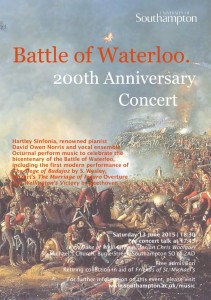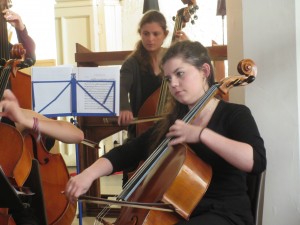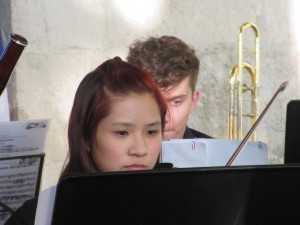Performing Wellington and Waterloo
For our final performance event of the academic year, Catherine Gosney (year 2) led a fascinating concert commemorating the 200th anniversary of the Battle of Waterloo – mixing some familiar favourites with lesser-known gems. Here she tells us about putting it all together:
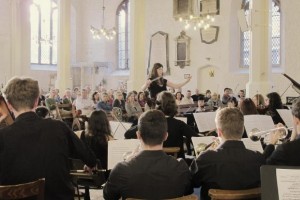
I love the art of programming. It combines the performance and musicological aspects of my degree and it can be a really exciting experience when you find something that you know will be entertaining but also intellectually stimulating. I often research events for friends, choirs or ensembles that I am involved in. When I discovered last year that it would be the 200th anniversary of the Battle of Waterloo, I knew it would be a great opportunity, not just in historical interest but in terms of the amount of repertoire that would be available and how easy it would be to generate publicity. I also knew that the Duke of Wellington’s ancestral home, Stratfield-Saye, was in Hampshire, so the local interest would be an added bonus.
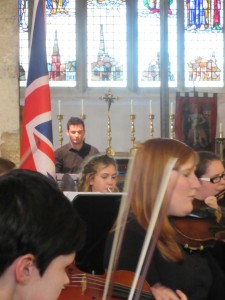 I remembered a Radio 4 programme by David Owen Norris called ‘The Duke of Wellington’s Playlist’, so in December I approached David to see if he might be interested in performing in a ‘Waterloo’ concert. In a happy coincidence, that week he was meeting Mike Bailey from The Madding Crowd, and David invited me to join them. Mike is a phenomenal researcher and had put together a large programme of vocal works entirely linked to the Duke of Wellington. He had discovered that in 1821 the Duke was given the freedom to the city of Winchester in a large ceremony at St John’s House, and he managed to trace down all of the music that they had performed on that occasion!
I remembered a Radio 4 programme by David Owen Norris called ‘The Duke of Wellington’s Playlist’, so in December I approached David to see if he might be interested in performing in a ‘Waterloo’ concert. In a happy coincidence, that week he was meeting Mike Bailey from The Madding Crowd, and David invited me to join them. Mike is a phenomenal researcher and had put together a large programme of vocal works entirely linked to the Duke of Wellington. He had discovered that in 1821 the Duke was given the freedom to the city of Winchester in a large ceremony at St John’s House, and he managed to trace down all of the music that they had performed on that occasion!
He kindly shared the music but I was still not sure on what basis I could put on a concert and whether it should be choral or orchestral. As David agreed to perform in the concert I decided that I would try to make it more of an event. I approached Jeanice Brooks to ask if it could be a music department concert knowing that they would then finance the printing of marketing material, sheet music and programmes. It would also increase the number of people that would volunteer to get involved and I also knew that as a departmental concert it would be far more widely advertised on campus.
I then started researching music related to the French Revolution, Napoleon and the Duke of Wellington. The choice was limitless; however, when I heard Wellington’s Victory by Beethoven I knew we had to perform it even though it commemorated the battle of Vittoria rather than Waterloo. But it’s always worth remembering that we beat Napoleon on more than one occasion! I knew it would make a fantastic finale to the concert that would leave the audience on a high.
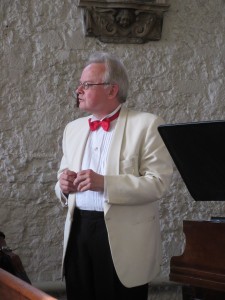
For the rest of the programme, I thought we needed a few more well known pieces to appeal to the wider public. I spoke to David about this and said that Eroica (original title Buonoparte Symphonie) is the obvious choice but that it would be too long. At that point he suggested just doing the first movement and that the Figaro overture would work nicely. The three pieces seemed a perfect combination of historical and musical interest. David chose to play a Schubert cantata (based on the writings of Ossian, a favourite of Napoleon) and a little known battle sonata by Samuel Wesley. It turned out that it was to be the first modern performance of The Siege of Badajoz and I was absolutely thrilled about this! It was also key to getting the event covered in the newspapers.
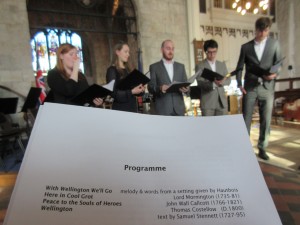
Finally I wanted to include some of the music that Mike Bailey had found so I approached the vocal ensemble Octurnal. One of their members had already agreed to perform the Schubert with David and gladly they agreed to perform a selection of pieces in the first half of the concert.
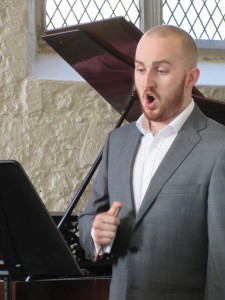
With committed soloists I could then focus on bringing an orchestra together. This was by far the most difficult part of organising the concert. Between April and June I was constantly emailing and messaging people back and forth. Some volunteered, some I had to chase, many pulled out, some came back! It was a constant battle(!) made more difficult by the scoring of Wellington’s Victory. Involving 6 trumpets, 4 French horns, 3 trombones and 4 percussionists, it was a logistical nightmare! Jamie Wall and George Smith helped enormously by encouraging players to join us and in advising how to assign the parts most appropriately. Furthermore the rehearsals were hampered by a lot of players not being able to make both rehearsals and the struggle to get the full list of percussion instruments to each rehearsal (2 bass drums, 2 side drums, another large drum, cymbals, triangle and two ratchets!). It really is a unique piece of music and my favourite part of the rehearsals was having to explain to the trumpet player on the French side that they get shot in the presto! (Interestingly, when the English trumpet finishes it coincides with an English cannon blast – Beethoven specifically scoring a case of friendly fire perhaps?!)
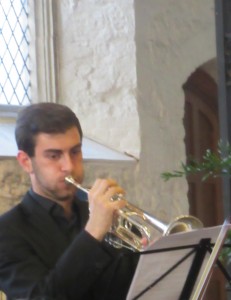
As a pianist a further disadvantage and difficulty was my lack of experience with orchestras. Luckily, I had a very supportive leader in Hannah Preston, who guided me in the specifics of rehearsal practice and concert etiquette.
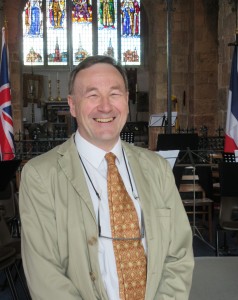
Having visited the Hartley Library’s Special Collections Gallery exhibition ‘Wellington and Waterloo’, it occurred to me that this might be an opportunity to bring the History and Music departments together. I was familiar with the work of Professor Chris Woolgar and sent him an email to ask if he might like to join us and give a pre-concert lecture. I can’t say how thrilled I was that he agreed! It really added to the occasion and it was a fascinating, insightful and entertaining talk that the audience thoroughly enjoyed! It was another of those moments that made me feel very lucky to be studying at the University of Southampton where we have so many renowned scholars. Chris is presenting an online course and if anyone is interested in the history of Wellington and Waterloo then this is a fantastic opportunity to learn more. It also includes many links to articles for those that couldn’t make the talk.
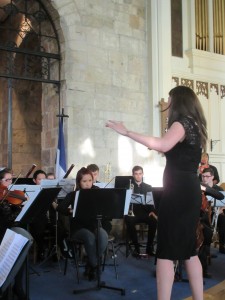 Many in the audience told me how impressed they were with the talk and I’m pleased to say that the exceptional performances of Octurnal, Peter Bridgwood and David Owen Norris continued to wow the audience. The orchestra came together so strongly in the afternoon rehearsal, and by the time of the concert they really played their socks off! It was an incredible experience bringing together a large group of people to produce something special. The final movement of Wellington’s victory was especially rousing and the energy and enjoyment of the players at this point was infectious. It was so exciting to conduct that my only disappointment of the night was that my enthusiasm might have meant that I got too carried away on the podium! I didn’t quite achieve the sophisticated, restrained conducting technique that I was aiming for!
Many in the audience told me how impressed they were with the talk and I’m pleased to say that the exceptional performances of Octurnal, Peter Bridgwood and David Owen Norris continued to wow the audience. The orchestra came together so strongly in the afternoon rehearsal, and by the time of the concert they really played their socks off! It was an incredible experience bringing together a large group of people to produce something special. The final movement of Wellington’s victory was especially rousing and the energy and enjoyment of the players at this point was infectious. It was so exciting to conduct that my only disappointment of the night was that my enthusiasm might have meant that I got too carried away on the podium! I didn’t quite achieve the sophisticated, restrained conducting technique that I was aiming for!
For those who want to read more, a really nice review of the concert appeared here.


